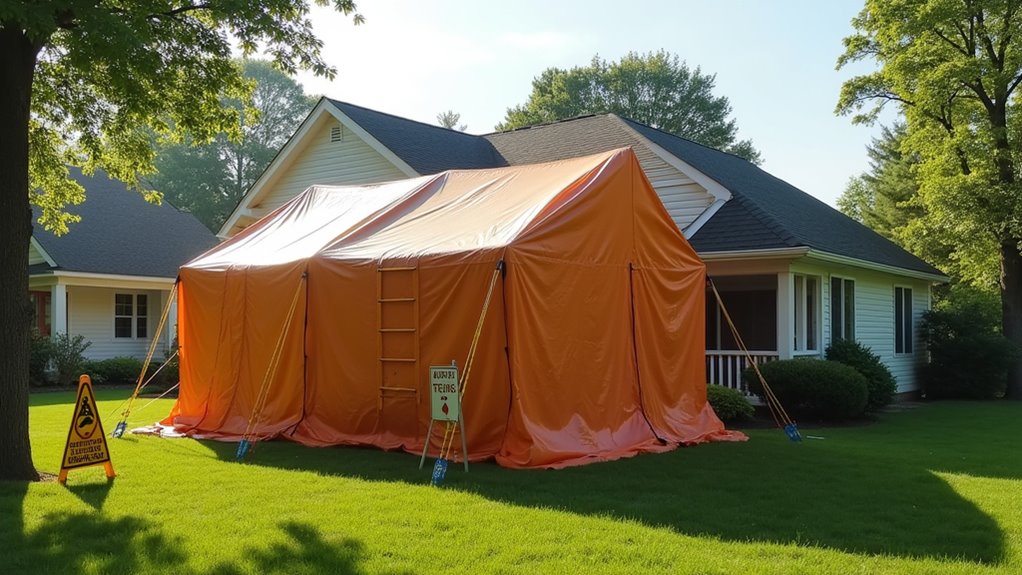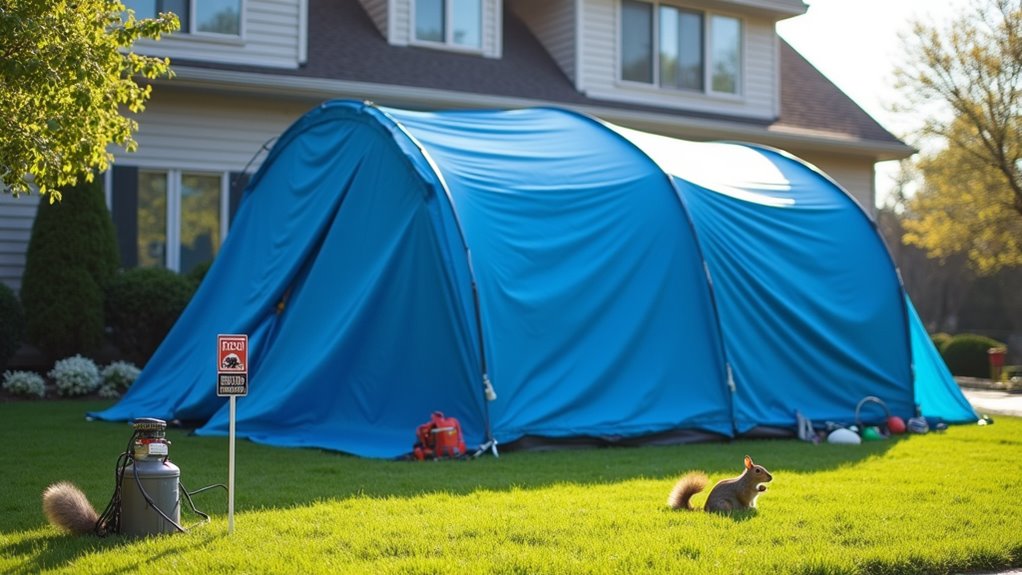Does Tenting A House Kill Rats
This post contains affiliate links. As an Amazon Associate, we earn from qualifying purchases.
Tenting a house is generally not effective for killing rats because they can often avoid the fumigant gases used in the process. While fumigation may eliminate some pests, rats typically survive unless entry points are sealed and sanitation is improved. For long-term rat control, traps and bait stations are more reliable methods. Further explanation and detailed strategies for managing rat infestations will be provided later in this article.
Essential Facts in 30 Seconds
- Tent fumigation mainly kills insects, not rats.
- Rats can avoid the fumigation gas and survive.
- Fumigation requires residents to leave due to toxic chemicals.
- Rats may return if entry points are not sealed and sanitation is poor.
- Trapping and baiting are more effective for rat control.
- Integrated Pest Management offers long-term prevention of rat infestations.
Understanding Tent Fumigation for Pest Control
Tent fumigation kills pests like termites and bed bugs inside your home. Specialists cover your house with a big tent to trap the gas inside. The gas seeps into every corner, reaching pests hiding deep in walls and furniture.
The treatment takes 1 to 3 days. Time depends on your home size and pest level. You must leave your home during this process. Take pets, plants, and food with you to keep them safe.
After sealing the house, experts release the fumigant gas. This gas kills pests by suffocation or poisoning. Once done, they open windows and doors to air out the house. They test the air to make sure it’s safe before you return.
This method works well against drywood termites and bed bugs. It reaches places sprays and powders cannot. Tent fumigation offers a thorough and effective pest solution.
When Is Tent Fumigation Necessary?
Severe rat infestations need tent fumigation to solve the problem fast.
Hidden nests block access to some home areas, making other methods useless. Pests in hard-to-reach places stay longer without fumigation.
This method kills all pests at once and clears your home completely. Studies show fumigation works best for full pest removal in tough cases.
Severe Infestation Assessment
Severe rat infestations need quick action. Live rats inside your home show a serious problem. Fresh rat droppings look shiny, black, and measure about ½ to ¾ inch.
Rats chew holes around doors and make burrows near tree roots. These signs mean rats have taken over your space. Persistent bad smells or grease marks on walls also warn of rats.
Rats can cause damage to your home and spread diseases. Without help in 30 days, the problem gets worse.
Tent fumigation kills rats deep in walls and hidden spots. This method clears large rat colonies fast and keeps your home safe.
Act now to stop rats before damage grows.
Accessibility Challenges
Tenting a house for fumigation needs careful planning for access. Homes with many rooms or locked spaces can cause problems. Check all doors, cabinets, and closets before setting up the tent. Give keys to the fumigator for locked areas.
Large safes and walk-in security rooms also need your attention. Stay nearby during setup and airing out. Cut back tall plants and remove roof antennas to stop tarp tears.
Pools and gates require special care. Keep gates open or watch them during fumigation. These steps help the fumigant reach every part of your home well.
Persistent Pest Presence
Persistent pests demand quick action, especially when normal methods fail. Tent fumigation becomes necessary in these cases:
- You see live pests, like rats, despite traps or baits.
- Wood shows damage or there are signs of nests in hidden spots.
- Rodents cause health risks by spreading disease or contaminating areas.
Knowing how pests behave helps spot infestations early. Severe infestations need experts.
A professional exterminator checks the problem and advises if tent fumigation suits best. This strong method kills pests completely, even in hard-to-reach places.
Comparing Tent Fumigation to Other Rat Control Methods
Tent fumigation costs between $2,000 and $6,000. It kills pests in many areas but may miss hidden rats. Rats often hide well and avoid gas, making fumigation less effective.
Trapping costs about $150 to $1,000. It catches rats one by one and works well. Poison bait costs $50 to $500. It kills rats but needs careful checking to keep pets and kids safe.
Professional exclusion costs over $1,000. It blocks rats from entering your home again. DIY traps cost $10 or more. They catch rats but need regular attention.
Trapping and baiting often control rats better. They target rats directly and cost less. Tent fumigation suits bugs and insects more than rats. For rat problems, traps and poison usually work best. Simple, safe, and cost-effective methods win.
Limitations and Risks of Using Tent Fumigation for Rats

Tent fumigation might seem like a quick fix for rat problems. It has big risks and limits you must know.
First, chemicals like Vikane used in fumigation are very toxic. People and pets must leave the house during treatment.
Second, fumigation works best on insects, not rats. Rats can hide in small holes or burrows and avoid the poison gas.
Third, rats come back fast if holes stay open or if the place is dirty. Rats need food and shelter to go away for good.
Using traps and bait stations works better. These tools catch rats and help control them over time.
Knowing how rats live and fixing the cause stops infestations for good. Safe and smart pest control beats fumigation every time.
The Role of Integrated Pest Management in Rat Control
Integrated Pest Management (IPM) is key to controlling rats after tent fumigation.
Start by sealing all holes and cracks where rats can enter. Keep your home clean and remove food scraps to stop rats from coming back.
Check your property often for signs like droppings or gnaw marks. Using traps and bait stations along with these steps helps lower rat numbers.
Studies show homes using IPM see fewer rat problems over time. This smart approach protects your home and keeps rats away for good.
Preventive Measures Importance
Preventive measures control rat populations and protect your home. Effective strategies bring long-term benefits and keep rats away.
Follow these key steps:
- Sanitation: Clean regularly to remove food and nesting places.
- Exclusion: Seal cracks and holes to block rat entry.
- Monitoring: Check bait stations and watch for rat signs.
These actions stop rats now and prevent future problems. They reduce health risks and protect your property.
Preventive care also cuts pest control costs. A strong plan creates a safer, cleaner home.
Monitoring Post-Fumigation Effectiveness
Monitoring after fumigation keeps rat control strong and lasting.
Use bait stations to check how much bait rats eat. Look for droppings, bite marks, and nests to see if rats still live nearby.
Electronic devices give exact data and help spot rats quickly. Visit sites often to catch new rat signs early.
Combine these steps in an Integrated Pest Management plan. Change your actions based on what the data shows. Keep collecting information.
This helps avoid using too many chemicals and targets only areas with rats. This way, rat control works better and lasts longer.
Economic Considerations for Tent Fumigation and Rat Extermination

Tent fumigation for rat extermination requires careful money planning. The cost depends on your home’s size and setup needs. Expect to pay between $1 and $4 per square foot.
For a 2,000-square-foot house, that means $2,000 to $8,000. Setting up the tent and sealing the area adds extra charges. Think of these as part of the total cost.
Spending more now can protect your home from costly damage later. Rats can harm wood, wires, and walls. Plus, they spread diseases that risk your health.
Stopping them early saves money and stress in the long run.
Frequently Asked Questions
Can Tent Fumigation Harm Pets or Wildlife Nearby?
Tent fumigation can be dangerous for pets nearby. Pets must leave the home during treatment. This keeps them safe from harmful gases. Wildlife usually stays safe if experts seal the tent well. Gas leaks can hurt animals outside. Following safety rules prevents accidents. Always move pets to a safe place before fumigation. This simple step protects your furry friends.
How Long Does Tent Fumigation Take for Rats?
Tent fumigation for rats usually lasts about three days. This time includes preparing the area, exposing it to gas, and airing it out. Rats hide well, so sealing the tent tightly is very important. Proper sealing stops rats from escaping and makes the treatment work better. This method kills rats inside walls and hard-to-reach spots. Many pest control experts recommend tent fumigation for serious rat problems. It clears the space of rats safely and thoroughly.
What Precautions Should I Take During Fumigation?
Prepare well before fumigation. Remove all food, medicines, and plants from the area. Cover furniture and electrical items with plastic sheets. Leave the house as soon as the pest control team starts. Follow all safety signs and warnings posted outside. Avoid entering the house until it is safe. Fumigation uses strong gases that can harm people and pets. Always let professionals handle the process. This keeps everyone safe and ensures pests disappear completely.
Are There Any Health Risks After Fumigation?
Fumigation can cause health problems. People often feel sick with headaches, nausea, or breathing trouble. Chemicals used during fumigation can irritate your lungs and eyes. Fresh air helps a lot. Open windows and doors well before entering again. It is safer to wait several hours or a day after fumigation. Protect your family by following these steps carefully. Stay alert to how you feel after fumigation. If symptoms last, see a doctor right away. Safety first!
How Can I Tell if the Fumigation Worked?
Signs show fumigation worked: fewer rat sightings, less droppings, and quiet spaces. Check the area every day. Watch for noises or new droppings. Rats leave about 40 droppings a day, so none means success. No chewed wires or food damage also helps. Keep checking for a week. This shows if rats stay gone.
Conclusion
Tenting a house can kill rats effectively. Many homes face rodent problems each year—about 30%. Tenting uses gas, like Vikane, to reach rats hiding deep inside. This method works well for big infestations. Still, it is best to use traps and block entry points too. These methods help stop rats from coming back. Talk to a pest control expert. They can suggest the best plan for your home.
